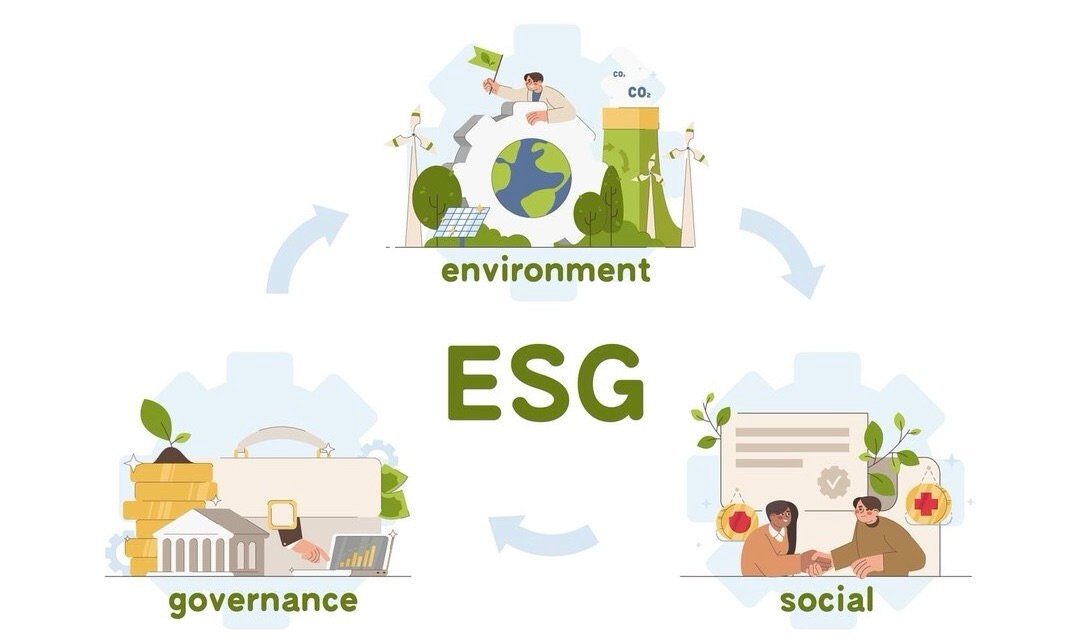In the contemporary landscape of commerce, profit maximization is no longer the solitary compass guiding financial decisions. A paradigm shift is underway, catalyzed by a discerning cohort of consumers and investors who demand more than just monetary gains. They seek out entities that champion environmental stewardship, social accountability, and ethical governance. This seismic shift dovetails with the ascendant prominence of ESG (Environmental, Social, and Governance) criteria, ushering in a new era where businesses are scrutinized not only for their financial performance but also for their societal and environmental impact.
Understanding the Triad of ESG:
Environmental Perspective:
The environmental facet of ESG hinges on assessing a company’s ecological footprint and its efforts to mitigate environmental degradation. Key considerations include:
- Combatting Climate Change: Companies face evaluation based on their commitment to reducing greenhouse gas emissions, embracing renewable energy sources, and devising strategies to mitigate climate-related risks.
- Efficient Pollution Management: Waste minimization, responsible resource allocation, and adherence to stringent environmental regulations form the cornerstone of sustainable business practices.
- Preserving Biodiversity: Embracing sustainable methodologies that curtail harm to natural habitats and foster biodiversity emerges as a distinguishing factor for environmentally conscious enterprises.
Social Dimension:
The social pillar of ESG delves into a company’s interactions with its stakeholders and its contributions to societal welfare. Key elements encompass:
- Fair Labor Practices: Ensuring equitable remuneration, fostering safe working environments, promoting diversity and inclusivity, and upholding labor rights emerge as pivotal benchmarks.
- Human Rights Adherence: Upholding human rights across all operational spheres, including supply chains, is imperative for fostering ethical business conduct.
- Community Engagement: Responsible enterprises actively engage in community development initiatives, thereby bolstering the well-being of the locales in which they operate.
Governance Framework:
The governance aspect of ESG entails an appraisal of a company’s internal structure and leadership dynamics. Salient features include:
- Robust Corporate Governance: Transparency in financial disclosures, robust internal controls, and a commitment to ethical business practices form the bedrock of effective governance.
- Diverse Board Composition: Inclusion of diverse perspectives on corporate boards, coupled with the incorporation of individuals possessing pertinent expertise, is increasingly valued.
- Equitable Executive Compensation: The implementation of equitable compensation structures for executives is imperative to bridge pay differentials and foster organizational cohesion.
The Significance of ESG Imperatives:
The burgeoning significance of ESG principles is underscored by several compelling factors:
- Risk Mitigation: Enterprises embracing robust ESG practices are better poised to weather regulatory scrutiny, mitigate reputational risks, and navigate operational disruptions stemming from climate change or societal unrest.
- Investor Allure: Studies evince that companies exhibiting stellar ESG performance tend to outshine their counterparts over the long haul, thereby attracting investors attuned to environmental and social considerations.
- Reputation Amplification: A burgeoning cohort of consumers is basing their purchase decisions on a company’s ethical and environmental ethos, thereby amplifying the significance of robust ESG practices in bolstering brand reputation and fostering customer loyalty.
- Catalyst for Innovation: Companies espousing ESG principles often find themselves at the vanguard of pioneering sustainable solutions and innovative technologies, thereby gaining a competitive edge in the market.
The Ascendant Ascendancy of ESG Principles:
Investor Impetus:
Asset managers are increasingly integrating ESG factors into their investment calculus, culminating in an upsurge in sustainable investment vehicles. A report by the Global Sustainable Investment Alliance (GSIA) revealed a staggering $38.2 trillion in global sustainable investment assets in 2021, underscoring the burgeoning traction of ESG-conscious investing.
Regulatory Terrain:
Governments worldwide are enacting stringent regulations aimed at addressing climate change and societal concerns, thereby exerting pressure on corporations to bolster their ESG performance and foster sustainable business practices.
Consumer Convictions:
An expanding cohort of consumers is proactively seeking out brands that align with their values and champion sustainability, thereby compelling companies to recalibrate their operational frameworks to resonate with evolving consumer preferences.
Navigating ESG’s Terrain: Overcoming Challenges and Charting a Resilient Trajectory:
- Standardization Imperative: The absence of universally accepted ESG reporting standards poses a formidable challenge, impeding the accurate comparison of companies on ESG metrics.
- Guarding Against Greenwashing: Some entities may resort to superficial measures to project themselves as environmentally or socially responsible, thereby necessitating vigilant oversight to thwart instances of greenwashing.
- Balancing Act: Effectively integrating robust ESG practices may necessitate initial investments and operational adjustments, compelling companies to strike a delicate balance between financial imperatives and sustainability imperatives.
In essence, ESG embodies not merely a transient trend but rather a profound metamorphosis in the modus operandi of businesses and the calculus underpinning financial decisions. By espousing principles of environmental stewardship, social welfare, and ethical governance, enterprises can fortify their resilience, magnetize investors, and catalyze the transition toward a more sustainable future. As stakeholders across the spectrum grow increasingly cognizant of the repercussions of corporate conduct, ESG stands poised to exert an indelible influence, shaping the contours of the corporate landscape in the epochs to come.
For companies looking to embody the ethos of sustainability beyond mere rhetoric, Taypro offers a pioneering solution in the realm of solar panel maintenance. Leveraging cutting-edge technology, Taypro specializes in manufacturing autonomous waterless AI-enabled microfiber cloth-based solar panel cleaning robots. Explore Taypro’s suite of services at Taypro India and embark on a journey toward sustainable energy optimization.





